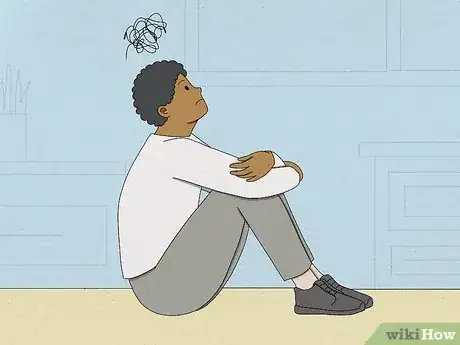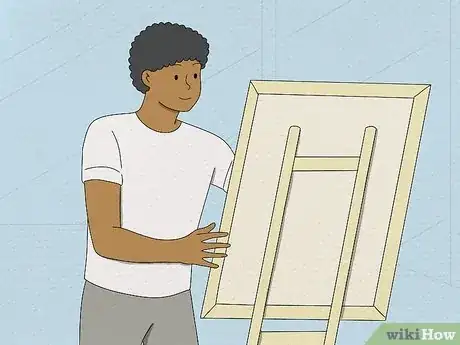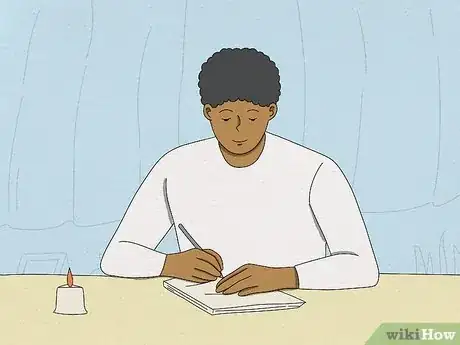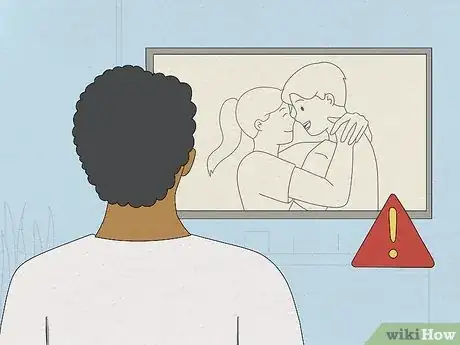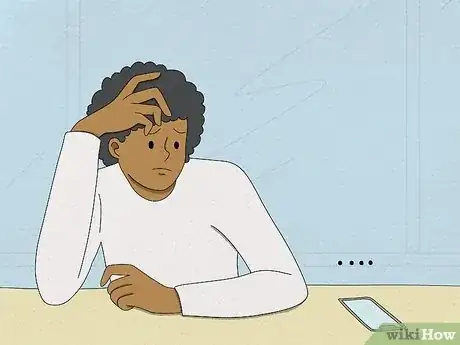This article was written by Elizabeth Weiss, PsyD. Dr. Elizabeth Weiss is a licensed clinical psychologist in Palo Alto, California. She received her Psy.D. in 2009 at Palo Alto University's PGSP-Stanford PsyD Consortium. She specializes in trauma, grief, and resilience, and helps people reconnect with their full self after difficult and traumatic experiences.
There are 11 references cited in this article, which can be found at the bottom of the page.
Do you feel guilty for saying “No” to your partner? Do you idealize them or want to “fix” them? If so, you may be in a codependent relationship. Codependency usually develops during childhood, but it can cause issues as you grow older. Fortunately, it’s a learned behavior that can be unlearned, as long as you know how to reclaim your time and energy. In this article, we’re providing everything you need to know to overcome codependency in your relationship so you can foster a healthy dynamic with your partner.
This article is based on an interview with our licensed clinical psychologist, Elizabeth Weiss. Check out the full interview here.
Things You Should Know
- Most codependents lose their identity because they’re too busy taking care of others. They usually engage in people-pleasing behavior because they have a fear of abandonment.
- If you’re codependent, seek therapy to determine the root of your behavior.
- To overcome codependency, identify what makes you feel stressed and set boundaries to protect your well-being.
- In order to form an identity outside your relationship, learn a new skill or pursue a childhood interest.
Steps
What is codependency?
-
Codependency occurs when you sacrifice your needs for someone else. A codependent partner believes the best way to express love and care is to prioritize their partner before anyone else, including themself. While this dynamic feels mutually beneficial at first, a codependent person may grow to resent their partner because their needs aren’t being met. Since both partners aren’t putting in the same amount of effort, the relationship becomes one-sided, where the codependent partner struggles to set boundaries.
- Codependency usually stems from childhood. If your parents weren't emotionally available or didn’t meet your needs growing up, you may have developed codependent behavior as a survival skill to receive attention or love.
- Analyze the costs and benefits of your relationship to determine if it’s worth staying in. While some partners are receptive to new boundaries, others may cross them repeatedly. If so, talk to a close friend or family member to establish an exit plan and leave your partner.
Signs That You’re Codependent
-
A codependent person seeks validation from other people. Codependent people often tie their self-worth to helping others, so they don’t understand who they are individually. If you aren’t sure whether you’re codependent, here are some of the most common traits[1] X Research source :
- You feel an exaggerated sense of responsibility for others.
- You have an extreme need for recognition and approval.
- You have a fear of being alone or abandoned.
- You have difficulty identifying your feelings.
- You don’t respond to change well.
- You have problems setting boundaries.
- You have difficulty making decisions.
- You feel a sense of guilt when you assert yourself.
- You idealize your partner.[2] X Trustworthy Source HelpGuide Nonprofit organization dedicated to providing free, evidence-based mental health and wellness resources. Go to source
- You take on too much responsibility.
How to Stop Being Codependent
-
1Seek therapy. If you discover you are codependent, reach out to a mental health professional to understand the root of your behavior. Although it can be hard to admit you need help, codependency can worsen over time if it isn’t addressed. Working with a therapist can help you push you through uncomfortable, scary changes as you navigate towards a more healthy, balanced relationship.[3] X Research source
- If therapy isn’t available or affordable to you, try Co-dependents Anonymous—it’s a peer-led recovery program that helps you develop healthy, balanced relationships. They host meetings online and in person, and their membership is completely free.[4] X Research source
-
2Set healthy boundaries. Think of boundaries as the limits you place around your physical, emotional, and mental health, alleviating the pressure to commit to something (or someone). To break free from your people-pleasing tendencies, identify what makes you feel stressed or drained, and then clearly communicate these boundaries to your partner.
- It can be difficult to state your boundaries at first, and it’s perfectly normal to experience guilt when you decline to help someone. With practice, it becomes easier, but consider professional help if you’re struggling to move past the first step of saying “No.”
- You can establish boundaries around your body, time, energy, and personal possessions. Don’t be afraid to set limits specific to your well-being—the more precise your boundaries are, the better.
- Remember that you don’t need to provide an apology or explanation for saying “No.” Someone who truly cares about you will respect your boundaries, even if they don’t fully understand or agree with them.
-
3Get to know yourself. Codependent people often lose their identity because they’re too busy taking care of others. To regain your sense of self, learn a new skill or volunteer. In healthy relationships, both people still maintain their individual interests, needs, and selves. Invest in things you love, and you’ll feel more satisfied—and by doing that, you’ll naturally be mending your codependent relationship, too [5] X Research source
- If you’re unsure what to pursue, reflect on your childhood interests. Did you enjoy painting? Writing stories? Playing trivia? Think of the things that made you feel like time flew by and consider revisiting them as an adult.
- Remember that you don’t have to be “good” at an activity to continue doing it—the purpose is to enjoy it.
-
4Prioritize self-care. Unlike codependent relationships, both partners support each other in healthy relationships. This dynamic isn’t possible unless you take time off for yourself, so remember that self-care isn’t selfish. By meeting your needs first, you’ll be more present with your partner, shifting your relationship from codependent to balanced.[6] X Research source
- Don’t be afraid to take a break from your partner—let them know you prefer spending time alone during a certain time frame, or dedicate one day out of the week to yourself.
- If you’re not used to taking time off, schedule it into your calendar. Try to do one thing for yourself every day, even if you don’t have much time. For example, you can try waking up 10-15 minutes earlier to journal, or you can wind down with a relaxing cup of tea.[7] X Research source
-
5Engage in positive self-talk. Your thoughts can manifest into reality, so improve your self esteem with positive affirmations. Loving self-talk helps you understand that your self-worth isn’t linked to making your partner happy, helping you heal from a codependent relationship. Once you believe that you are worthy of love, you’ll be able to overcome your people-pleasing tendencies and foster a deeper connection with your partner.[8] X Research source
- Remind yourself of your positive traits daily, and don’t feel weird or awkward hyping yourself up. If you feel attractive in the morning, give yourself a compliment.
- You may find it helpful to verbally state manifestations. For example, you could say, “I am strong, powerful, and confident” or “I am enough, and I am worthy of love.”
- If you’re bombarded with doubts, get rid of negative thoughts by writing down your insecurities on a piece of paper. Then, rip up the paper to physically and mentally discard them.[9] X Trustworthy Source Association for Psychological Science Nonprofit organization devoted promoting trustworthy research and education in the psychological sciences Go to source
-
6Be mindful of the media. Unlike most couples depicted in film and TV, devoting your entire life to someone else isn’t healthy or realistic. Seeing an idealized relationship on-screen can skew your idea of a healthy relationship, setting unrealistic expectations (for either partner). When you watch a show, call out codependent behavior when you see it. By pointing out these tendencies, you and your partner can work together to maintain a healthier dynamic.[10] X Trustworthy Source Greater Good Magazine Journal published by UC Berkeley's Greater Good Science Center, which uses scientific research to promote happier living Go to source
- Remind yourself that what you see isn’t necessarily “relationship goals,” despite what other people may say on social media.
Signs You’re In a Codependent Relationship
-
In codependent relationships, there’s an imbalance of power. One partner is giving more of their time, energy, and effort into the relationship, while the other partner consciously (or unconsciously) takes advantage of the situation. Since romantic relationships are symbiotic by nature, it can be difficult to identify when codependency takes place, but here are some common behaviors that signal you’re a codependent partner[11] X Trustworthy Source Cleveland Clinic Educational website from one of the world's leading hospitals Go to source :
- You feel like you need to protect or “save” your partner.
- You want to change or “fix” your partner.
- You find it hard to stay motivated by daily activities when your partner isn’t around.
- You can’t describe how you feel about your relationship.
- You feel anxious when your partner doesn’t reply to you.
- You don’t like being alone.
- You cancel on plans with your friends to spend more time with your partner.
- Your space doesn’t feel like a home without your partner.
- You feel guilty after addressing an issue with your partner.
- You hesitate to speak out or stand up for yourself because you’re afraid of the outcome.
- Your partner doesn’t respect or honor your boundaries.
- You have a fear of your partner leaving you or loving you less if you tell them “No.”
You Might Also Like
 How to Outsmart a Narcissist
How to Outsmart a Narcissist
 How to Make a Narcissist Miserable: 12 Things They Can't Stand
How to Make a Narcissist Miserable: 12 Things They Can't Stand
 How to Beat a Narcissist
How to Beat a Narcissist
 11 Ways to Confuse and Disarm a Narcissist
11 Ways to Confuse and Disarm a Narcissist

 How to Destroy a Narcissist in Court: 11 Effective Tips
How to Destroy a Narcissist in Court: 11 Effective Tips
 When a Narcissist Loses Control: What to Expect and How to Get Control Back
When a Narcissist Loses Control: What to Expect and How to Get Control Back



 How to Confront a Narcissist about Their Behavior
How to Confront a Narcissist about Their Behavior



References
- ↑ https://www.mhanational.org/co-dependency
- ↑ https://www.helpguide.org/articles/relationships-communication/codependency.htm
- ↑ https://youtu.be/GWwwLXU9nTs?t=423
- ↑ https://coda.org/wp-content/uploads/2020/07/What-is-CoDA-BRO.-4010A.pdf
- ↑ https://youtu.be/GWwwLXU9nTs?t=296
- ↑ https://www.mha-em.org/im-looking-for/mental-health-knowledge-base/wellness/145-co-dependency-and-self-care
- ↑ https://youtu.be/GWwwLXU9nTs?t=497
- ↑ https://youtu.be/GWwwLXU9nTs?t=357
- ↑ https://www.psychologicalscience.org/news/releases/bothered-by-negative-unwanted-thoughts-just-throw-them-away.html
About This Article


